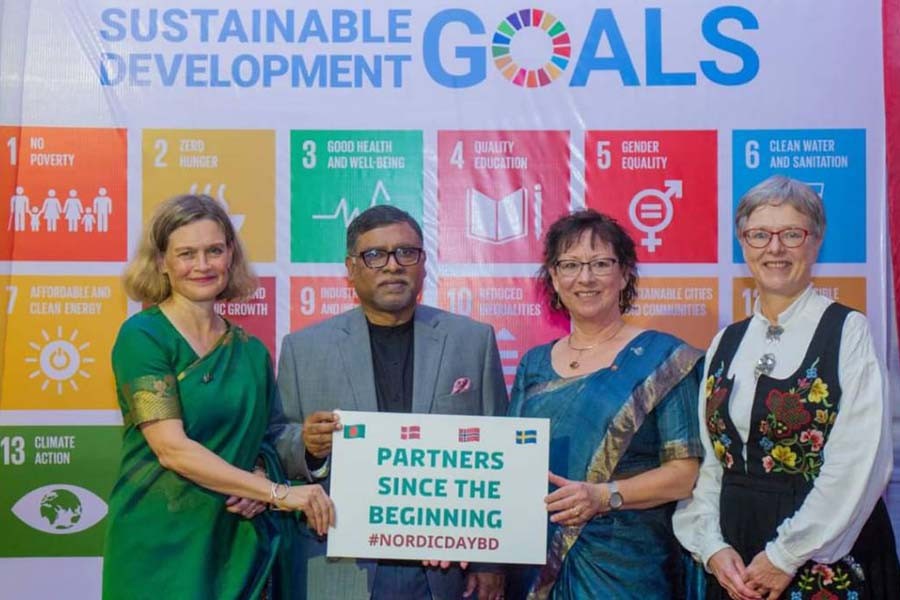Nordic countries keen to work with Bangladesh to combat marine litter

Published :
Updated :

Norwegian Ambassador to Bangladesh Sidsel Bleken has said the Nordic countries hope to work with Bangladesh to reach a global agreement to combat marine plastic litter and microplastics.
“We need to work together to ensure not only a greener, but also a bluer economy. We are worried about the rapidly increasing levels of marine plastic litter and microplastics,” she said.
Bleken said it while sharing the stage of Nordic Day reception with Danish Ambassador Winnie E. Petersen and Swedish Ambassador Charlotta Schlyter at Nordic Club on Monday evening, reports UNB.
Health Minister Zahid Maleque was present as the chief guest at the celebrations attended by diplomats stationed in Dhaka, business leaders, civil society representatives and journalists.
In future, Ambassador Sidsel said, the oceans will be even more crucial for global food security, poverty reduction, international transport, and efforts to address climate change and the environment.
She said ensuring that the oceans are healthy and productive for the future generation is high on the agenda both in Bangladesh and in Nordic countries.
On business relations, Ambassador Sidsel said sustainable and green business, financing and procurement is the future.
“And we see new win-win opportunities between Nordic and Bangladeshi companies steadily growing.”
The Norwegian Ambassador said sustainable business is something that so many Nordic companies represent.
“This is something that we want you to remember from this Nordic evening. Nordic companies represent a more sustainable and more innovative way of doing business. Ever increasing investments and efforts go into creating green solutions, clean energy and circular economy,” she said.
Ambassador Winnie said they share a “strong commitment” to achieving the Sustainable Development Goals (SDGs) and to support other countries in achieving the goals.
She said they cooperate in international organisations such as the United Nations, where they present joint candidatures.
For example, Danish Ambassador Winnie said, Norway is a candidate on behalf of all the Nordic countries for the Security Council for the period 2021-22.
The Danish Ambassador said they are pleased to see how Bangladesh has taken a leading role in climate adaptation as well as disaster risk reduction.
Swedish Ambassador Charlotta said gender equality is a central part of the fabric of the Nordic countries and in just a few decades, the Nordics have become societies where men and women share work and life in the same arenas.
The changes have been possible thanks to civil society and through changes in law and policy, she said adding that this has brought positive change to both men and women.
“Men’s role in the family and as parents is better recognised. Women’s place in the world of work is as well. Nearly 80 per cent of Nordic women work outside the home,” the Swedish envoy said.
Ambassador Sidsel said they have seen the change of world of politics and around half of parliamentarians and ministers in their countries are women.
“It is very encouraging to see that Bangladesh, too is putting gender equality up front in its work towards the SDGs,” she said adding that their countries stand ready to continue to support Bangladesh in its gender equal future.
Ambassador Winnie said they are proud to see all the traces that the long-standing partnership have left and all the possibilities for the future. “We look forward to continue our close relations to Bangladesh as we go forward.”
The three Nordic countries recognised Bangladesh on the same day, 4 February 1972, and have been partners during the five decades that have passed since then.
Ambassador Sidsel said there is a reason why the three Nordic countries in Bangladesh, celebrated the day together. “The Nordic countries have a strong tradition of working together.”
In Bangladesh, Denmark, Norway and Sweden share joint Embassy premises.
Ambassador Charlotta they also have common priorities in their dialogue with Bangladesh, including on gender equality, and on issues of good governance such as ease of doing business.


 For all latest news, follow The Financial Express Google News channel.
For all latest news, follow The Financial Express Google News channel.